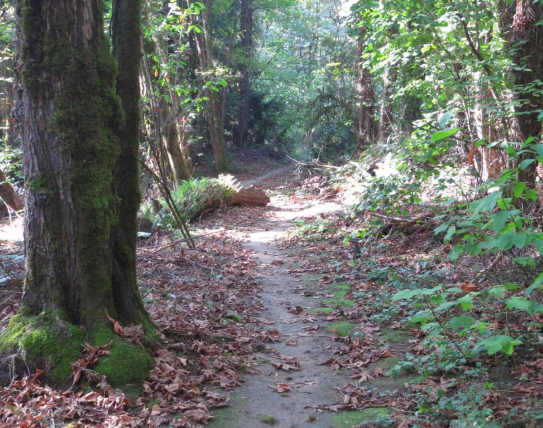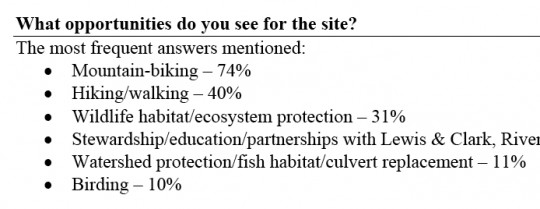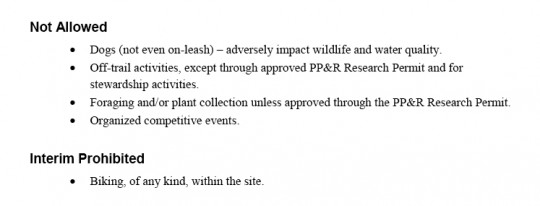
(Photo from River View Natural Area Management Plan)
The Portland parks bureau has released its final management plan for the River View Natural Area and they’ve left the door cracked open — ever so slightly — for the possibility of off-road cycling access in the future. However, because the city’s process prevented a robust discussion of all potential trail uses, the plan is full of uncertainty. If it’s adopted by City Council as scheduled in mid-December it could have the unintended consequence of making it harder to allow cycling even if the city’s own planning process deems it appropriate at a later date.
First, some background…
The 146-acre parcel that borders Lewis & Clark College and Riverview Cemetery in southwest Portland was the subject of a bruising public process that left biking supporters scorned. After the city bought the parcel, off-road cycling advocates worked hand-in-hand with the parks bureau with an understanding that biking — which has taken place at River View for decades and is by far the most requested use of the park in the city’s own surveys — would continue to be part of the future of the site. When the unexpected and unexplained decision to prohibit cycling came down in March it led to an appeal with the State Land Use board by the Northwest Trail Alliance.
That appeal was ultimately dismissed and the process continued toward its goal of creating a management plan that will dictate how the parcel will be developed in the future. That plan has now been released.
Planning for uncertainty?
“We have the chance to do this correctly by allowing the Master Plan process to be completed, and then making sound decisions based on that process.”
— Brian Baumann, NW Trail Alliance
At issue is a question of process and timing: The management plan itself doesn’t preclude the possibility of future cycling trails, yet it was intentionally developed without cycling in mind. Therefore, if the management plan is adopted by city council only to have the ongoing Off-Road Cycling Master Plan determine that cycling is a compatible use, the city would then have to re-open the plan and make a change. The un-sealing a plan that has already been adopted by council might prove too large of a process hoop for cycling trails to jump through.
Because of that unexpected and unexplained decision back in March by Parks Commissioner Amanda Fritz to ban not only cycling itself but also any discussion of it during the planning process, the plan’s trail concepts and recommendations do not adequately reflect the valuable off-road cycling expertise and perspective that was on the project advisory committee.
The NWTA’s Brian Baumann said he thinks the management plan should not be adopted until after the master plan has assessed River View. Here’s what we heard from Baumann via email today:
“It is a ‘cart before the horse’ scenario to approve the RVNA Management Plan and begin to build trails while off-road cycling is temporarily banned. We have the chance to do this correctly by allowing the Master Plan process to be completed, and then making sound decisions based on that process… I see no harm in taking more time and not moving forward with it in it’s current form.”
Advertisement
A glimmer of hope with “interim” status
The one small victory for cycling advocates is that the management plan does not shut the door entirely to future cycling.
In a section listing public uses that are “allowed” and “not allowed,” biking is put in a separate category: “interim prohibited.” “The use of mountain bikes will remain a prohibited use until completion of the City’s Off-Road Cycling Master Plan,” the plan states, “through which RVNA [River View Natural Area] will be considered as a candidate property for cycling.”
Is that “iterim” designation a legitimate placeholder for a full consideration of cycling at River View or is it just a political stall tactic? (Both parks bureau staffers assigned to this project are currently out of the office and unavailable for comment.)
The city has promised that the main goal of the Off-Road Cycling Master Plan is to take an objective look at all parcels in the city and assess whether or not they are compatible with cycling trails. The concern from bike advocates is that the management plan is set up in such a way to essentially guarantee that the Master Plan process will not find River View as a feasible site for cycling.
When cycling at River View comes up during the master plan process, it’s likely to stir up debate yet again, which is why some people felt it should have been dealt with more thoroughly in the management plan.
The debate today and what’s to come
“I take issue with this plan not expressly prohibiting mountain bikes as a use.”
— Torrey Lindbo, Tryon Creek Watershed Council Board President
In an official comment published with the management plan, the Collins View Neighborhood Association said that the mere consideration of cycling at River View is “irresponsible” due to ecological concerns. “Why is River View Natural Area being considered [for cycling],” their statement reads, “… Collins View is wary that the report leaves the Natural area totally open to off road cycling without qualifying the site’s suitability.”
In official comments on the plan, Tryon Creek Watershed Council Board President Torrey Lindbo also said cycling should be prohibited. He wanted the city to put cycling in the “not allowed” use category. “The site does not appear to provide conditions that would support safe incorporation of mountain biking as a trail use. …I take issue with this plan not expressly prohibiting mountain bikes as a use. …I will be extremely disappointed if the city considers allowing mountain biking within RVNA as part of the Off‐Road Cycling Master Plan process.
Countering those viewpoints, another influential conservation group supports biking in River View. Audubon Society of Portland Board Member and project advisory committee member Jay Withgott said he feels the city erred in not definitively answering the cycling question during the River View planning process:
“Speaking for Portland Audubon, I will mention that others at Audubon feel strongly that the issue of mountain biking should have been addressed as part of a holistic management plan for this site at this time, and not postponed pending a larger landscape scale review. They feel that there was sufficient information to have decided this issue at Riverview as part of the current process and that there is a place for mountain biking at River View.”
The minority report
Three members of the River View project advisory committee signed a minority report to express their disappointment with the management plan process and urge the city to make cycling a higher priority. In their dissenting opinion, Baumann with the Northwest Trail Alliance, River View neighbor Chris Sautter and professional cyclist Charlie Sponsel claimed that since hiking and running are acceptable uses at River View, cycling should be too. “No credible reason has been cited for removing off-road cycling from the plan,” they wrote. Their letter claims that properly built trails can handle biking and hiking without harming the ecology.
Here’s more from their letter:
“… off-road cycling can be done in a sustainable manner on properly-built trails. Off-road cycling on trails was not considered a significant ecological impact to RVNA during the initial surveying process. Off-road cyclists bring trail building expertise to RVNA, as well as the necessary volunteer labor to maintain trails. Off-road cyclists volunteered more than 450 hours of their time, in partnership with Portland Parks, to make the multi-use trails at RVNA more sustainable, and have proven to be the best trail stewards in many projects across Oregon. As we heard from PP&R’s staff, singletrack mountain bike trails do not pose a threat to TEES Interior habitat designations and do not pose a threat to Willamette River water quality or temperature. Those are the two most important resources we are tasked with protecting at River View, and the city’s own experts do not consider trails to be a significant threat.
… the draft plan as written provides reduced recreation opportunities for all uses, including off road cyclists and pedestrians. The proposed single large loop around the perimeter of the property and smaller upper loop are significantly limiting the variety of trails and routes.”
The signees of the minority report are also still stinging from how the River View process was handled. They say City Commissioners Amanda Fritz and Nick Fish circumvented the public process when they “unilaterally and arbitrarily” banned cycling and any discussion of it back in March. “Before the ban,” the statement continues, “the Technical and Public Advisory Committees were engaged in spirited debate about mountain biking and its compatibility with the environmental and recreational goals for River View.”
The plan is scheduled for a council vote on December 16th. If Baumann and other advocates get their way, that “spirited debate” will play out long before any plan is set in stone.
— Jonathan Maus, (503) 706-8804 – jonathan@bikeportland.org




